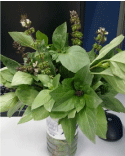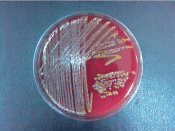Abstract
Peritonitis is a serious complication of peritoneal dialysis. A variety of microorganisms are identified in these cases and during recent years a new one was included, Pantoea species. In our report, we present 2 cases of patients on CCPD with a peritonitis episode caused by this organism. The source of infection in one of the cases was thought to be due to gardening of the plant Basil, while unknown in the other case. In microbiologic culture, this organism was identified and the patients were started on antibiotics with success in one case while the other requiring catheter removal. The number of reported cases with this organism has increased in last years and various infection localizations and clinical progress patterns have been identified. In peritoneal dialysis patients presenting with peritonitis, this organism must be kept in mind.
Keywards: Peritonitis; Pantoea species; Peritoneal dialysis
Introduction
For patients on peritoneal diaysis, peritonitis is an important cause of mortality and morbidity. The treating physician needs to keep a high index of suspicion and treat peritonitis early to improve outcome and reduce complications. While usual gram positive and gram negative organisms make most of the cases, recently one unusual environmental gram negative family appeared to be the cause.
The organism Pantoea, belongs to the family Enterobacteriaceae and is responsible for infectious diseases mainly from plant-thorn injuries, causing arthritis, osteoitis, osteomyelitis to bacteremia. Until now a number of clinical cases of peritonitis caused by this organism have been described.
We present two cases (Case A and B) of peritonitis with Pantoea species at our center, both of which had different course and outcomes requiring different treatments.
Case Reports
Case A
The first case was a 19 year old male who has been on Peritoneal Dialysis for last 2 years without complications and no history of previous peritonitis, presented with 3 days history of abdominal pain and fever. The symptoms started two days after spending time gardening a specific type of plant calledReyhan - (Basil) at his home, although the patient did not remember any event of thorn pricks while planting Figure 1.

Figure 1: Basil Plant from patient’s garden.
Upon evaluation, there was diffuse abdominal tenderness but there were no signs of exit site or tunnel infection. The PD fluid was found to be cloudy and analysis showed White cell count of 1000 with 92% neutrophils. Other investigations revealed serum WBC count 7.6k/ul, ESR 30mm/hr, CRP 0.4mg/dl, Lactic acid 3.1mmol/L. Patient was started on empirical treatment including Intraperitoneal Ceftriaxone and Vancomycin. The Blood cultures were negative; however the PD fluid culture grew Pantoea species sensitive to Cephalosporins, Gentamycin and Tazobactam. The patient showed significant improvement and disappearance of symptoms on the third day. The PD fluid WBC dropped to 22k/ul with normalization of ESR and lactic acid levels and the fluid culture became negative after 5 days of treatment. Patient was discharged home and he completed 14 days of antibiotic therapy. Over the next one year, patient did not have any further episodes of peritonitis, and the repeated PET test did not show any changes on the membrane characteristics.
Case B
The second case was a 33 year old female who was receiving APD for 3 years and had two prior episodes of culture negative peritonitis.
She had been visiting Paris for 2 weeks but did not report any significant events such as injuries cuts or pricks. She developed vomiting, abdominal discomfort and diarrhea two days before presentation. Upon evaluation patient was ill looking with fever, and diffuse abdominal tenderness. The PD fluid was slightly hazy with WBC count of 602 and 83% neutrophils. Her Serum WBC count was 3.9k/ul, ESR 67mm/hr, CRP 8.3mg/dl, Lactic acid 1.4mmol/L. She was started empirically on Intraperitoneal Ceftriaxone and Vancomycin. The PD fluid culture was released on 4th day which grew Pantoea Species, sensitive to Ceftazidime, Gentamycin and Tazocin Figure 2.

Figure 2: Pantoeaagglomerans strain producing yellow pigmentation on
blood agar.
She failed to show any significant clinical improvement in the following days and the repeated PD fluid white cell count continued to rise on the 3rd, 5th and 7th days. The antibiotics were changed to Meropenam and Gentamycin. Due to persistent abdominal pain, it was decided to remove the catheter on 11th day, following which remarkable improvement was noticed. She was given total 3 weeks of the last antibiotic regimen and was shifted to hemodialysis temporarily, returning back to peritoneal dialysis in about 3 months time. No significant changes were observed on subsequent PET tests.
Discussion
Peritonitis is a serious complication of peritoneal dialysis [1] and early treatment is essential to prevent mortality and morbidity including future changes in membrane characteristics and possible ultrafiltration failure. In recent years, increasing number of cases due to rather uncommon organisms has been reported. One such genus is Pantoea, a Gram-negative aerobic bacillus belonging to the Enterobacteriaceae family. This organism is found especially in plants, fruits, vegetables and also human and animal feces [2]. Its transmission is generally associated with plant thorn injuries, intravenous anaesthetic catheters, contaminated parenteral nutrition and subgingival sites with periodontal diseases [3,4]. Reported infections include osteoitis, osteomyelitis, arthritis [8] to systemic infections and severesepticemia. Peritonitis is a rare presentation of this organism. The symptoms of Pantoea associated peritonitis are similar to those with other pathogens, including fever, nausea, vomiting and abdominal pain. It can cause symptomatic peritonitis with a fatal outcome. Therefore, microbiological evaluation and antibiotic susceptibility tests should be required for every peritonitis episode as suggested by International Society for Peritoneal Dialysis (ISPD) guidelines [5]. Pantoea peritonitis shows good response to antibiotics.
We are reporting two cases of Pantoea peritonitis in our PD patients. One patient had probably acquired from gardening of plant Basil, while the other did not have a clear causal event. Growth of Pantoea in both patients was highly sensitive to most antibiotics, however one patient did not respond well to antibiotics and required removal of catheter Table 1.
Case(Ref.)
Type pf PD
Sex/Age
Proposed Etiology
Antibiotics used/route
Outcome
1 (12)
NA
F/2
Teething of catheter
Cefotaxime, Gentamycin/IP
Cured, Cathterreplaced
2 (13)
CAPD
F/49
Rose-Thorn Injury
Ceftazidime, Amikacin/IP
Cured
3 (6)
CCPD
M/65
Unknown
Ciprofloxacin/IP
Cured
4 (7)
CAPD
M/51
Rose-Thorn Injury
Cefepime/IP
Cured
5 (14)
NA
F/52
Unknown
Ciprofloxacin/Oral
Cured
6 (15)
CAPD
M/45
Thorn Injury
Ciprofloxacin/IP
Cured
7 (16)
CCPD
M/56
Unknown
Tobrmycin
Cured
8 (4)
APD
F/89
Unknown
Imipenam/IV
Patient Died
Our Case A
APD
M/19
Thorn Injury (Basil)
Ceftriaxone/IP
Cured
Our Case B
APD
F/33
Unknown
Meropenam, Gentamycin
Cured, Cathter removed
Table 1:
In review of literature, we found that only a few case reports of Pantoea associated peritonitis. The mode of infection and pathogenesis of this disease in this patients’ group remained unclear. There is no proven better diagnostic technique for identification. The incubation period is uncertain and inappropriate growth media and identification methods could be the reason for negative results. Different contamination patterns were identified like rose-thorn injury and teething on a catheter in these reports also [12-14]. However, some patients proposed etiologies were unknown [14,15].
Response to treatment is favorable and early treatment has resulted in successful resolution of peritonitis in majority of cases. In PD patients, peritoneal function tests may be affected after this infection. Ultrafiltration failure has been observed in some cases and peritoneal calcification and thickening were considered as possible pathologies [16].
Conclusion
In summary, relatively new organisms are recently reported to be causing peritonitis in PD patients. Pantoea has also been reported and has been treated successfully with antibiotics, either with or without removal of catheter, while causing one mortality. One of our presented patients responded to antibiotics alone, while the other required removal of catheter. Further studies are required to ascertain the mode of transmission and the adequate duration and modality of treatment.
References
- Troidle L, Gorban-Brennan N, Kliger A. Finkelstein FO. Continuous peritoneal dialysis-associated peritonitis: a review and current concepts. Semin Dial. 2003; 16: 428-437.
- Bottone E, Schneierson SS. Erwinia species: an emerging human pathogen. Am J ClinPathol. 1972; 57: 400-405.
- Kratz A, Greenberg D, Barki Y, Cohen E, Lifshitz M. Pantoeaagglomerans as a cause of septic arthritis after palm tree thorn injury; case report and literature review. Arch Dis Child. 2003; 88: 542-544.
- Kahveci A, Asicioglu E, Tigen E, Ari E, Arikan H, Odabasi Z, et al. Unusual causes of peritonitis in a peritoneal dialysis patient: Alcaligenesfaecalis and Pantoeaagglomerans. Ann Clin Microbiol Antimicrob. 2011; 10: 12.
- Li PK, Szeto CC, Piraino B, Bernardini J, Figueiredo AE, Gupta A, et al. Peritoneal dialysis-related infections recommendations 2010 update. Perit Dial Int. 2010; 30: 393-423.
- Magnette C, Tintillier M, Horlait G, Cuvelier C, Pochet JM. Severe peritonitis due to Pantoeaagglomerans in a CCPD patient. Perit Dial Int. 2008; 28: 207- 208.
- Ferrantino M, Navaneethan SD, Sloand JA. Pantoeaagglomerans: an unusual inciting agent in peritonitis. Perit Dial Int. 2008; 28:428-430.
- Ulloa-Gutieerrez R, Moya T, Avila-Aguero ML. Pantoeaagglomerans and thorn-associated suppurative arthritis. Pediatr Infect Dis J. 2004; 23:690.
- Lau KK, Ault BH, Jones DP. Polymicrobial peritonitis including Pantoeaagglomerans from teething on a catheter. South Med J. 2005; 98: 580-581.
- Lim PS, Chen SL, Tsai CY, Pai MA. Pantoea peritonitis in a patient receiving chronic ambulatory peritoneal dialysis. Nephrology. 2006; 11: 97-99.
- Habhab W, Blake PG. Pantoea peritonitis: not just a “thorny” problem. Perit Dial Int. 2008; 28: 430.
- Moreiras-Plaza M, Blanco-García R, Romero-Jung P, FeijóoPiñeiro D, Fernandez-Fernandez C, Ammari I. Pantoeaagglomerans: the gardener’s peritonitis? ClinNephrol. 2009; 72: 159-161.
- Borràs M, Roig J, Garcia M, Fernández E. Adverse effects of pantoea peritonitis on peritoneal transport. Perit Dial Int. 2009; 29: 234-235.
